CHAPTER II
THE REFORMATION PERIOD ON THE CONTINENT
THE PROTESTANT REFORMATION IN GERMANY
23. The Indulgence.—About the end of the fifteenth century the venerable Basilica of St. Peter, which had been built by Constantine the Great, was threatened with destruction. The pope had therefore resolved to take it down, and erect a new structure, magnificently planned in accordance with the new art (§ 17). To facilitate the collection of funds, Pope Leo X, in 1514, promised a plenary indulgence to those who would, according to their means, contribute to so praiseworthy an undertaking—besides of course fulfilling the conditions usual in the case of a plenary indulgence, namely, the reception of the sacraments.
An indulgence was then what it is now: a remission, outside the sacrament of penance, of temporal punishment due to sins which are already forgiven. The Church attaches indulgences to certain good works which she wishes to encourage, as prayers, pilgrimages, acts of mercy. In the past the good work was sometimes almsgiving, or contribution toward the building of a church, or toward other charitable or pious enterprises.
24. Archbishop Albrecht of Mainz (§ 18, note) was commissioned by Pope Leo X to publish the indulgence in a large part of Germany and send the money gathered from it to Rome. He in turn appointed subcommissioners. The latter, commonly learned, pious, and eloquent preachers, went from place to place, sought by appropriate sermons to rouse the people to genuine contrition and a good confession, and collected the alms that were offered.

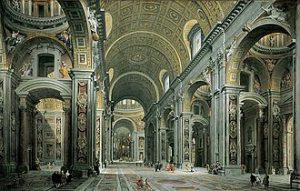
This church, the largest Christian place of worship in the world, took about 150 years to build. It was consecrated in 1626.
It is evident that this procedure, though correct in itself, was open to serious abuses. The commissioners might lay more stress on liberal donations than on the necessity of contrition and confession. On handing in his alms a person received an indulgence certificate, by which ample faculties were granted to any confessor whom the holder of the certificate might choose. This feature in particular was apt to leave on superficial minds the impression of a mere business transaction, the more so as the commissioner was allowed to raise or lower the amount according to his estimation of the applicant’s wealth. [Footnote: As far as the twelfth century there are cases on record of popes who granted indulgences for the purpose of raising money. Toward the end of the Middle Ages this sort of indulgence became so common that loud complaints were raised on all sides. In fact, whenever in the fourteenth century this means of raising revenue was resorted to, the same complaints, founded or unfounded, were sure to follow. Great men, as Cardinal Jiménez, openly expressed the opinion that such indulgences should be granted less frequently and then only with greater precautions against abuses. Particularly odious were those indulgences which were granted, not for the benefit of some local work of piety or charity, but to divert money to Rome. In the case of the indulgence proclaimed by Leo, the trouble was aggravated by the reports of the scandalous way in which the proceeds of the jubilee indulgence of 1500 had been disposed of under Alexander VI.]
25. Archbishop Albrecht of Mainz appointed John Tetzel, a Dominican friar, as his chief subcommissioner. This much maligned priest, personally of blameless character, undoubtedly went too far in his endeavors to procure financial success. He insisted indeed on the necessity of contrition and confession for all those who wished to obtain the remission of temporal punishment for themselves; but his teaching concerning the indulgence for the dead contained serious errors.
To secure this benefit for a soul which has, of course, departed this life in the state of Grace, nothing, according to him, is required but the alms. He who wishes to apply it to the soul of a deceased person need not be in the state of Grace or have any contrition for his sins.
This doctrine, though at his time actually taught by some irresponsible preachers, has never been supported by ecclesiastical authority. Tetzel’s own brethren in religion openly reproached him for his ill-advised tactics, which soon became the talk of the whole country.[Footnote follows: It is without the slightest reason that Tetzel’s opponents accuse him of an immoral life or ascribe to him such silly statements as that indulgences remit sins without contrition and confession, or the duty of restitution, or that they are even pardons for future sins. The saying, however, that the soul jumps out of purgatory as soon as the money tinkles in the box, though it may not be literally his, is in keeping with his erroneous doctrine on indulgences for the dead.] They furnished another element of discontent to those who sincerely or hypocritically lamented the evils of the Church.
26. Martin Luther. — At this time there lived in Wittenberg, in the Electorate of Saxony, as a professor in the university of that city, an Augustinian friar, already famous for his vigorous popular eloquence and his great ability in teaching. Martin Luther was born in 1483. After entering the order, he was for many years looked upon as an edifying religious. But the question whether his sins were really forgiven began to worry and torment him. Being of a headstrong and self-willed disposition, he refused to listen to the advice of his confessors and superiors, and endeavored to settle his troubles by his own reasoning and studies. At the same time he became more and more remiss in the observance of his rules and the practices of piety.
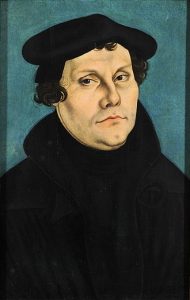
At last he imagined he had made the discovery that the doctrine of the Church concerning the remission of sins was altogether wrong. He thereby implied that Christ, contrary to His solemn promise, had allowed the Church to fall into a most disastrous error. The new system, which gradually developed in Luther’s mind, confused sin with concupiscence, which is a consequence of original sin, and, though it makes man inclined to sin, is no sin in itself. By the sin of Adam, he thought, human nature was corrupted beyond recovery; man’s acts can only be bad; but Jesus Christ covers the soul with His infinite merits, which, as it were, conceal all trespasses from the eye of the just God; if sinful man expresses his firm “belief” in this merciful dispensation, God will not punish him, though the sin is not taken away, but merely covered; the sinner therefore ever remains a sinner; the sins committed by St. Paul before his conversion were never truly forgiven. It is evident that such a justification is no justification at all, and it will always remain a riddle how Luther could maintain that he had found such a monstrous doctrine in the Bible.
He had already begun to propound these ideas in the pulpit as well as in the lecture room. It was rumored abroad that a strange kind of theology was being taught at Wittenberg. So far, however, Luther did not think of separating himself from the organization of the Church.
27. Luther Opens the Conflict, October 31, 1517. — When Tetzel on his preaching and collecting tour arrived in the neighborhood of Wittenberg and people flocked to him, Luther at once took up the subject of indulgences. In his lectures, sermons, and in the confessional he inveighed against Tetzel. On the Eve of All Saints’ Day, he posted a set of 95 theses on the door of the principal church. These propositions he offered to defend in public disputation against all comers.
The greater number of his theses treated of indulgences, but attacked rather the doctrine itself than the abuses connected with it. Nearly half of the theses impugned other points of ecclesiastical teaching, particularly the power of the Church relative to the remission of sins. Though the theses were written in Latin, the language was less exact than calculated to catch the popular mind by appealing to prejudice and passion.
Such challenges were by no means uncommon in the universities. But because of the discontent and abuses of the time, Luther’s theses created a sensation far beyond the circles of the university and the confines of the city. Within a short time they were the talk of the whole country. Luther saw his advantage and followed up his success with other writings, both popular and scientific. Opposition arose, and soon a brisk literary warfare was going on. Many serious-minded men sided with the bold monk, in whom as yet they hailed a courageous champion of their own just complaints. The radical humanists (§ 16), of whom there were many in Germany at that time, took up his cause enthusiastically. His religious superiors and the bishop of the diocese left him at liberty. The prince in whose territory he lived, the Elector of Saxony, was rather pleased to notice that the university which he himself had founded, attracted so much attention.
Luther became more and more audacious. In the struggle with his adversaries, the dogmas of the Church were thrown overboard one by one, and his own system grew more definite and radical.[Footnote follows: On Luther see the pamphlet, The Facts about Luther, by P. O’Hare.]
28. The Final Break with the Church. — When Pope Leo X sent a legate to Germany to investigate the causes of the disturbance, Luther first appealed to the pope himself, later from the ill-informed pope to a better-informed one — a step which was revolution pure and simple — then from any pope to a General Council, next from all Councils to the Bible, and lastly from the Bible to himself as the supreme judge of the right interpretation of the Bible. Several of the books of Holy Writ were pointed out to him as being in the most glaring contrast to his self-made teachings. He boldly declared they did not belong to the Bible at all. He still wrote most submissive letters to the Roman Pontiff, while in his works he reviled him as the Antichrist and worse than the Turk. Since 1519 he appears resolved to break completely with the Church.
By this time he had rejected the supernatural efficacy of the sacraments; had declared void the religious vows, and the duty of celibacy in priests; had deprived matrimony of its supernatural character as sacrament and of its indissolubility; had denied the dignity and jurisdiction of pope and bishops; and had invited the emperor and other temporal rulers to seize upon the rich ecclesiastical possessions, including the Papal States.
Several attempts to win back Luther by kindness had failed. At last the pope solemnly condemned forty-one of his theses and expressly threatened excommunication against him if he would not recant within sixty days. Counting upon the support of his humanist friends and of all the dissatisfied elements in clergy and laity, on the protection of his prince, the Elector of Saxony, and on the assistance of a wide-spread party of disgruntled knights, Luther defied the papal verdict. He secured a copy of the bull and in view of a large crowd of students and people threw it into a bonfire before the gates of Wittenberg, December 10, 1520. Thus the break with the Church and the whole Christian past was finally sealed.
29. Luther before the Diet of Worms. — In 1519 Emperor Maximilian had died. One of his last acts had been an earnest and rather gloomy letter to the Roman authorities to bring to their notice the innovations that were taking place in the empire. He was succeeded by his grandson Charles, king of the vast Spanish dominions in both hemispheres.[Footnote:
The following table will help to clear up the family connections which led to this accumulation of power and its subsequent division.
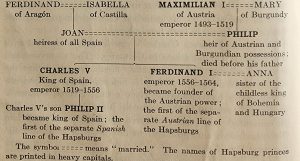
The young Emperor Charles V saw himself confronted with the religious complications in Germany. The numerous and powerful adherents of the apostate monk demanded that the emperor take the matter in hand. Since the highest ecclesiastical authority had meanwhile given a final verdict, Charles V consistently refused to allow a formal judicial proceeding. But he consented that Luther be given another chance to declare his submission, and promised to intercede for him with the Supreme Pontiff.
With an imperial safe-conduct Luther came to the Diet at Worms, 1521, the first which Charles held. But the monk’s obstinacy destroyed every hope of reconciliation. The emperor pronounced against him the “Edict of Worms,” which was to take effect after sixty days. It declared Luther an outlaw, ordered his books to be burned, and forbade all Germans to profess his doctrines or give him any assistance or encouragement. The Elector of Saxony and other princes, however, refused to allow the edict to be carried out in their territories and were too powerful to be forced into obedience.[Footnote follows: Luther possessed a perfect control of his native tongue and knew how to talk to the common people. This, together with an incredible capacity for work, is one of the many causes of his success. Pamphlets and leaflets were his favorite weapons, and they always appeared at the right moment. In 1521 he began his German translation of the Bible, which is recognized to be more genuinely German than any of the eighteen that preceded it. (He did not make the language, as is often claimed; but he devoted much time and study to mastering it more thoroughly.) He did not scruple to manipulate the sacred text so as to suit his own new doctrines. One of his Catholic opponents stated that he had counted not less than 1400 false or inaccurate renderings. Luther’s Bible had an enormous sale and incidentally contributed much to fix and generalize the language. It was soon, however, successfully rivaled by good Catholic translations.]
30. The Rebellion of the Lower Nobility. — When Luther defied the pope, he counted on a revolutionary movement which was spreading in the empire. It proceeded from two strata of the population, the lower nobility and the peasants.
The ascendency of the foot soldier (§9) had deprived the lower nobility of their natural occupation. The English knights had found another field of usefulness, but the German knights had not. This numerous class consisted of men who owned each a castle with some land, which in many cases did not yield enough to allow them the expensive style of living which they thought was the privilege of their station. Moreover, the old national laws were gradually supplanted by the Roman law, which greatly favored the power of territorial rulers. Though exemplary in many ways it was after all a foreign law, grown out of different circumstances. It did away with the old popular courts and introduced new ones presided over by trained jurists, who managed to draw out the proceedings in order to get larger fees. For poorer people, including the lower nobility, it was very difficult to obtain redress. There was, therefore, a general state of discontent, which drove many knights into the ranks of the highway robbers.
One Franz von Sickingen had made himself the champion of the “oppressed” knights. By the promise of unlimited plunder he gathered large bands around him, harassed the cities and princes, extorted large sums of money, and tormented and killed the helpless inhabitants of villages and monasteries. For a change he served as a French general. Luther’s declamations and writings against pope and bishops made Sickingen a soldier of the “Gospel.” Ulrich von Hutten, a profligate of the same stamp, but also a writer of elegant Latin verse, had helped to gain him for the cause of Luther.
After the Diet of Worms, Sickingen conceived the plan of building up a kingdom for the new religion. He even thought of dislodging the emperor and driving the pope out of Italy. He secretly gathered thousands of knights and marched, in 1522, against the Archbishop of Trier, an uncompromising opponent of Luther’s “Gospel.” But the attack upon the city failed. Sickingen retired, devastating the country fearfully. He soon fell mortally wounded while defending his own castle. This was the first war waged in the name of the new religion.
31. The Rebellion of the Peasants. – During the preceding century the German peasants, whether serfs or not, had, on the whole, been prosperous. But this prosperity was rapidly declining.
The rise of commerce had caused the formation of merchants’ companies, or trusts, which artificially raised the price of all commodities. The peasants themselves had become involved in debts by their extravagance. But historians mention above all the introduction of the Roman law as one of the chief causes of the deterioration of their condition. Then came the “Gospel” of Luther. “His pamphlets were full of appeals to the worst human passions. The burning of convents, the plundering and slaying of priests and bishops, was declared to be not only pleasing to God but necessary under pain of damnation. He heaped calumnies and insults on the princes who closed their countries to his ‘Gospel,’ and hurled invectives even against the emperor himself.” The peasants drew their own conclusions from this gospel of hate. They formulated their demands, some of which, however, were fully justified, in what they called the Peasants’ Articles. Large sections of these they had taken from Luther’s writings. Their banner was the Bundschuh, a coarse peasant’s clog, raised upon a pole.
Thus began the frightful revolution called the Peasants’ War, which involved about one fifth of Germany. It took armies of ten and twenty thousand soldiers to put it down. There had been other peasants’ risings in Germany before this, but never had such acts of fiendish cruelty been committed. It was the effect of the preaching of Luther and the Lutherans. The soldiers on their part retaliated with equal ferocity. When Luther perceived that the cause of the peasants was lost, he savagely turned against them and hounded on the princes to inflict the most terrible punishments.
As a result of this war, more than a thousand castles and monasteries lay in ashes on a territory smaller than the State of Ohio. Contemporary writers estimate the number of the slain at 150,000. The country swarmed with beggared widows and orphans. As the original records were destroyed, the peasants had to consent to new terms or were refused definite contracts. [Footnote follows: While the horrible carnage was going on, Martin Luther celebrated his wedding with Katharine von Bora, an escaped nun.] In the seventeenth century the Thirty Years’ War completed the degradation of most of the German peasantry. It was long before they rose again to the prosperity they had possessed in the fifteenth century.
32. Lutheranism and the Temporal Rulers. — By his attitude during and after the Peasants’ War, Luther had forfeited the adherence of the lower classes. The new doctrine had put an end to the episcopal jurisdiction (that is, the jurisdiction of the bishops of the Church) in the territories of certain princes. Hence Luther now turned to these temporal rulers and made them heads of their respective “churches.” There were now as many “popes” as Lutheran princes.
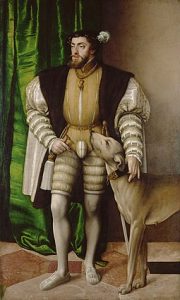
In these principalities the “Church” became the servant of the state, a kind of spiritual police department.[Footnote follows: In a Diet held at Speyer (Spires), 1529, the Catholic party, still in the majority, had an imperial edict passed which forbade the Lutheran princes to molest their Catholic subjects. Against this fair enactment the Lutherans “protested,” and henceforth they, as well as all those sects that arose later, were designated as Protestants. This merely negative term strikingly expresses the fact that the new religion has not produced any positive element for the betterment of mankind. The following year, at Augsburg, the Protestant princes presented to the emperor a lengthy document, which set forth their belief. It is called the Augsburg Confession and is recognized by the Lutherans as their creed. It was, however, opposed by some of their own number from the beginning.]
In former centuries the people could appeal from a tyrannical Henry IV of Germany, or a Henry II of England, or a Philip II of France to a higher judge, the Roman pontiff. The very presence of an independent priesthood was a check on princely despotism. The new religion rendered the subject helpless. There was already a strong tendency in all rulers, great and small, to make themselves absolute. Luther and the movement he started enormously furthered this tendency. It is now that princely absolutism reaches its climax. Catholic rulers also succumbed to this contagious disease.
EMPEROR CHARLES V
(1519-1556)
33. Charles V and the Religious Question. — Charles V was sincerely attached to the Church and resolved to preserve Germany in the Catholic religion. But his difficulties were great. He had many troubles in his kingdom of Spain. His almost continuous wars kept him away very frequently from the empire and made him dependent on the good will of his subjects. This was the basis for his ill-advised policy of reconciliation, which led him to expect too much from concessions to the innovators. Had he shown more firmness, no doubt the losses of the Church would have been smaller. Toward the end of his reign he even meddled in doctrinal matters. He had set his hope upon a General Council to be celebrated on German soil, but the means he used to bring it about and his attempts at interfering with its workings cannot but be severely condemned. On the other hand he certainly was instrumental in saving at least one half of Germany for the true faith.
His brother Ferdinand, who commonly represented the absent emperor, though personally a devout Catholic, shared his too conciliatory views.
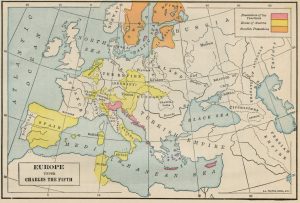
34. The Foreign Wars of Charles V. — Francis I, king of France, carried on four wars against the emperor. In the second, which the French king began contrary to his sworn promise, even Pope Clement VII was on his side, because it seemed the emperor might become too powerful in Italy. The pope, however, soon wished to withdraw, and in fact an armistice had already been arranged for. But the imperial army, consisting of German Lutherans, Spaniards, and Italians, demanded the arrears of their pay. When this was not forthcoming, they marched against Rome. Their leader fell while scaling the walls; and thus Rome, the most cultured city of the world, was for a whole month at the mercy of some 40,000 troopers with nobody to control them. Deeds of unspeakable cruelty and destruction were perpetrated. The peace which concluded this war is called the Ladies’ Peace, because its conditions were fixed by the mother of Francis and the aunt of Charles.
In 1530 Charles V was crowned by Pope Clement VII in Bologna — the last coronation of an emperor of the Holy Roman Empire. All his successors were merely “emperors elect.”
35. The Turks, meanwhile under their Sultan Solyman had overrun all Hungary. At the battle of Mohács, 1526, they routed the Christian forces. The king and the flower of Hungarian knighthood fell on the battlefield. Solyman then with an army of 200,000 men laid siege to Vienna, the capital of the Austrian dominions, 1529. The garrison of not more than 12,000, under their aged commander, Count Salm, held out heroically, until the approach of the winter forced the Turks to retreat. Two years later an army of Germans and Hungarians, partly equipped at the expense of Pope Clement VII, saved the northwest of Hungary from Turkish domination.
In 1533 Charles carried out a successful expedition against the Mohammedans in Tunis and freed 20,000 Christian captives.
This victory brought on another war between Francis I and the emperor. Francis even entered into an alliance with Solyman. Combined French and Turkish ships preyed upon the commerce of Christians in the Mediterranean. In the French wars the emperor held his own quite well against all aggressions.
36. The Rebellion of the Protestant Princes. — A number of Lutheran princes of the empire formed an alliance for the purpose of promoting Protestantism and preventing the Catholics from regaining the ecclesiastical possessions which the Protestants had seized by various methods of fraud and force.
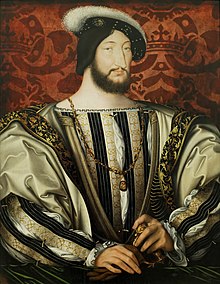
When the emperor ordered them to dissolve the revolutionary league, they refused, but were signally defeated. Maurice, Duke of Saxony, though a Lutheran, had sided with the emperor, and as a reward was made Elector. To regain his lost prestige among the Protestants he dastardly turned against the unsuspecting emperor, and began a series of horrible depredations against Catholic territories. The emperor, completely unprepared, barely escaped captivity.
Broken and discouraged, Charles V concluded with the Protestants the “Religious Peace of Augsburg,” 1555. This agreement established the principle, Cujus Regio, Illius Religio (whose is the country, his is the religion), that is, the religion of the prince determines what religion the subjects are to profess, and if they refuse to do so they must emigrate. Of course this principle might be applied and was actually resorted to by Catholic princes as well. It was another strengthening of autocracy. It was also provided that Church property confiscated before 1555 would remain in the hands of its present holders, but no more was to be taken in the future. To secure the aid of the French king for his purpose, Maurice the rebel had entered into an alliance with him and gave the three German cities of Metz, Toul, and Verdun into his hands. This was the first of the steps by which Alsace and Lorraine became French.
37. Charles V’s Successors. — A year after the Peace of Augsburg Charles V abdicated his dignities both as emperor and as king of Spain. His brother Ferdinand followed him as emperor (elect) and possessor of the Austrian dominions. His son Philip II received Spain, the Netherlands, Milan, and Naples. Charles withdrew to a Spanish monastery, where he devoted his time to works of piety and study. He died in 1558.
Supported by the claims of his wife, Ferdinand had been elected hereditary king by the Hungarians after the Bohemians had chosen him to the same position in their own country. He thus became the founder of the power of Austria.
By this division of the Hapsburg possessions, there were established two branches of the family, the Austrian line beginning with Ferdinand, and the Spanish line beginning with Philip. (See the table on page 40.) The religious troubles had enormously increased the weakness of Germany. Hence the French kings turned their aggressiveness from Italy to their northeastern neighbor. Here neither Alps nor Pyrenees stood in the way, while domestic dissensions and the lack of a strong central power made defense difficult. For the next hundred years we find the French kings nearly always in alliance with the Protestant German princes against the Catholic emperor.
FURTHER EXTENSION OF PROTESTANTISM
38. Ulrich Zwingli, a priest in Switzerland, started a “reformation” in his own country, in 1519, two years after and similar to that of Luther. He, too, rejected the authority of pope and bishops, the celibacy of the priests, the religious vows, the necessity of good works. The usual plundering of monasteries and confiscation of Church property followed, and was one of the motives that induced several cantons to accept the innovation. Others, however, the three original “Forest Cantons” among them, remained faithful to the Catholic Church. Like their German brethren the Swiss reformers were soon at war with their Catholic fellow citizens. Zwingli himself fell in one of the civil strifes (1531). There was a deadly hatred between Zwingli and Luther, because the former took the liberty of explaining Holy Scripture in a different way. Zwinglianism was subsequently merged into Calvinism.
39. John Calvin, a Frenchman, entered upon his public career as heretic in 1534. The most characteristic doctrine of his system is that every man has been predestined beforehand by God to either heaven or hell, so that it is not in his power to change his final fate. Calvin gave to his “church” a strictly democratic mode of government. There are no bishops; the highest officials are the priests or rather ministers elected by the congregation. Hence the name of Presbyterianism from presbyter, priest.
Calvinism spread through parts of France, Germany, and Holland, and to Scotland. From the latter country it came to England under the name of Puritanism, so called from its tendency to “purify” the divine service of every trace of the old Roman rites. But its real home is the city of Geneva, now belonging to Switzerland. Here Calvin himself ruled with Draconic severity. The churches were stripped of altars, pictures, statues, and every kind of ornamentation. The most rigorous laws regulated the minutest details in the life of the people.

The whole city rose at four o’clock. Recreations were severely restricted. A dressmaker was put in jail for three days for making the dress of a bride too beautiful. Within four years there were more than 800 cases of imprisonment, 76 decrees of exile, and 58 executions among the 15,000 inhabitants. A Spanish physician, Servetus, who denied the Blessed Trinity, happened to come to Geneva. He was arrested, found guilty of heresy, and burned at the stake [Footnote Follows: Servetus was an investigator of rare ability. He had discovered the circulation of the blood. It was a misfortune for him and for the science of medicine that he did not refrain from dabbling in theology. His theory was embodied in the theological work which cost him his life, and of which only two copies survived him. The important discovery was made again fifty years later by the English physician Harvey. See Walsh, The Century of Columbus, pages 369 and 370.] – with the approval of the Swiss and German Protestant authorities. Calvin kept himself in power by the assistance of the numerous foreigners who went to Geneva to study theology under him, and who all became citizens directly upon their arrival. (See Guggenberger, II, 211-213.)
Calvinism was the most aggressive and intolerant of the new “religions.” None tends more relentlessly toward complete civic and political influence.
40. Protestantism in Other Countries of the Continent. — Beyond the northeastern frontier of the Empire along the shores of the Baltic the Teutonic Knights had founded an independent state of their own. The Knights were one of the several religious and military orders founded during the crusades for the purpose of defending the Holy Land against the infidels. In the thirteenth century the Teutonic Knights had transferred their activity to the shores of the Baltic and had gradually spread Christian religion and civilization among the fierce pagan Prussians and other tribes. Later, however, in the fourteenth and fifteenth centuries, they had involved themselves in wars with the Christian Poles and, as a consequence, had lost all their lands except East Prussia; and even this remaining territory the order held as a vassal of the Polish king.
In Luther’s time Albrecht of Brandenburg-Anspach, a member of the Hohenzollern family which since 1414 had ruled the Electorate of Brandenburg, became head or grand master of the order. Like Luther he broke his religious vows, changed East Prussia into a secular vassal state of Poland, and forcibly introduced Lutheranism. Those of the Knights who remained faithful to their religion and their vows withdrew to their possessions in southern Germany, where the order existed until 1803.
The family of Duke Albrecht died out with his own children. But he had made an agreement with the Hohenzollern princes of Brandenburg that on his death the duchy of East Prussia should be united with the Electorate of Brandenburg. The annexation, which made East Prussia a province of Brandenburg, took place in 1618.
Livonia, the northeastern part of the order’s dominions, preserved the Catholic religion some thirty years longer. Then its “Army-Master” took the same step as Albrecht of Prussia, and the land became a Polish fief. Later on the Swedes and finally the Russians occupied Livonia.
In Poland the spread of Protestantism was pretty well checked, though its few adherents obtained bare toleration. Transylvania, a vassal state of Hungary, became entirely Lutheran. In Hungary the Calvinists grew so numerous that they could successfully demand freedom of public worship. But the country as such remained Catholic.
In Sweden Gustavus Vasa, justly admired as the hero of Swedish liberty, turned traitor to his better self and by all manner of deceit and violence forced Lutheranism upon the country. In Denmark and Norway the new religion was introduced by the same means. Everywhere the change of religion brought with it a considerable diminution of popular liberty. The republic of Iceland lost both liberty and religion and became a Danish province.


